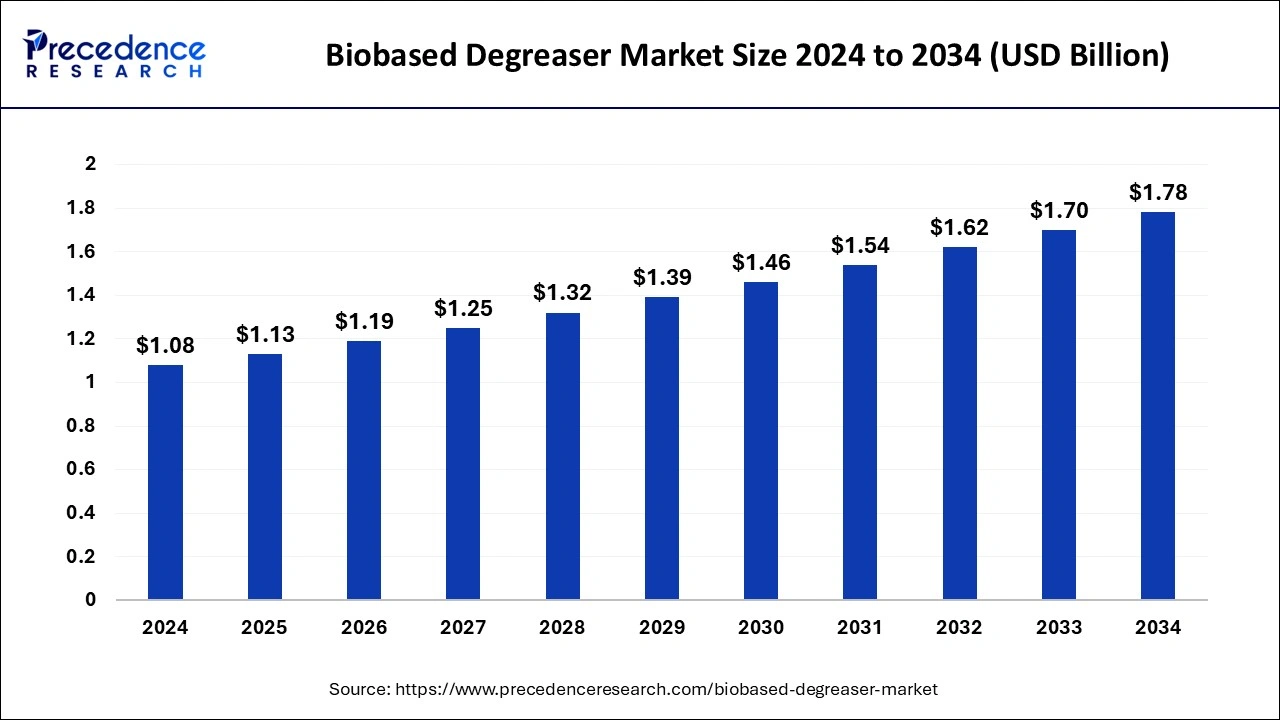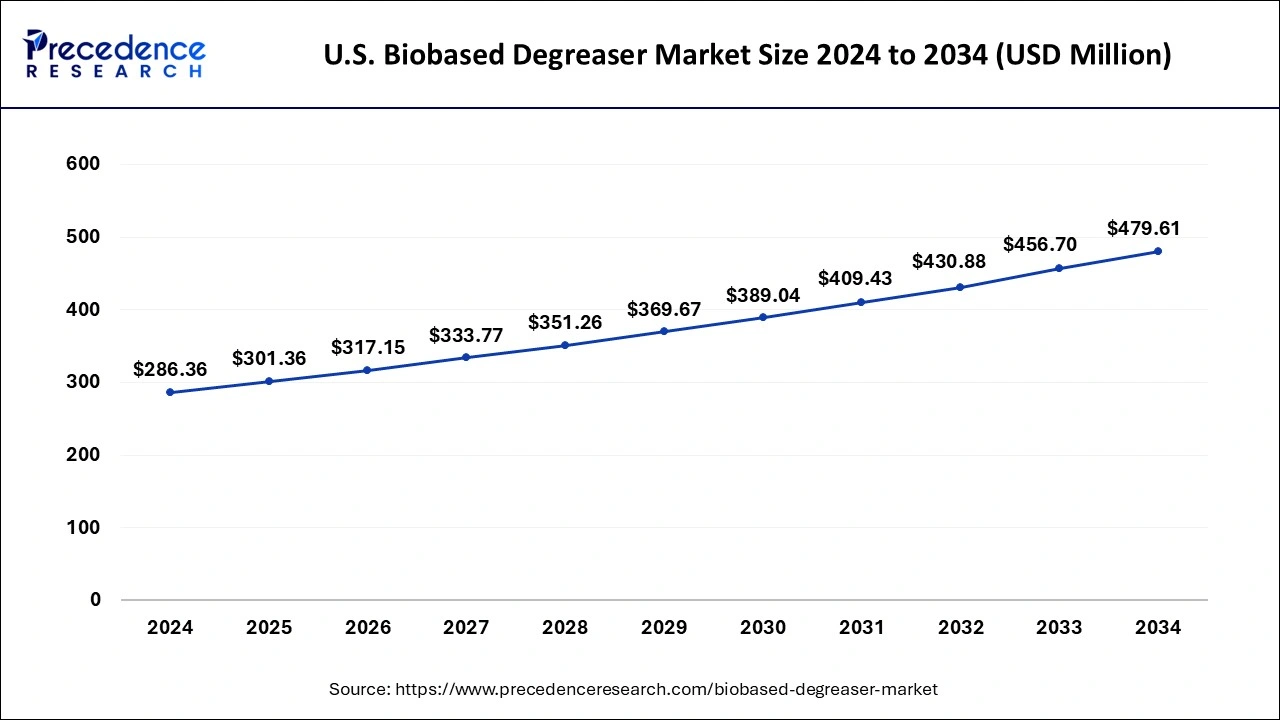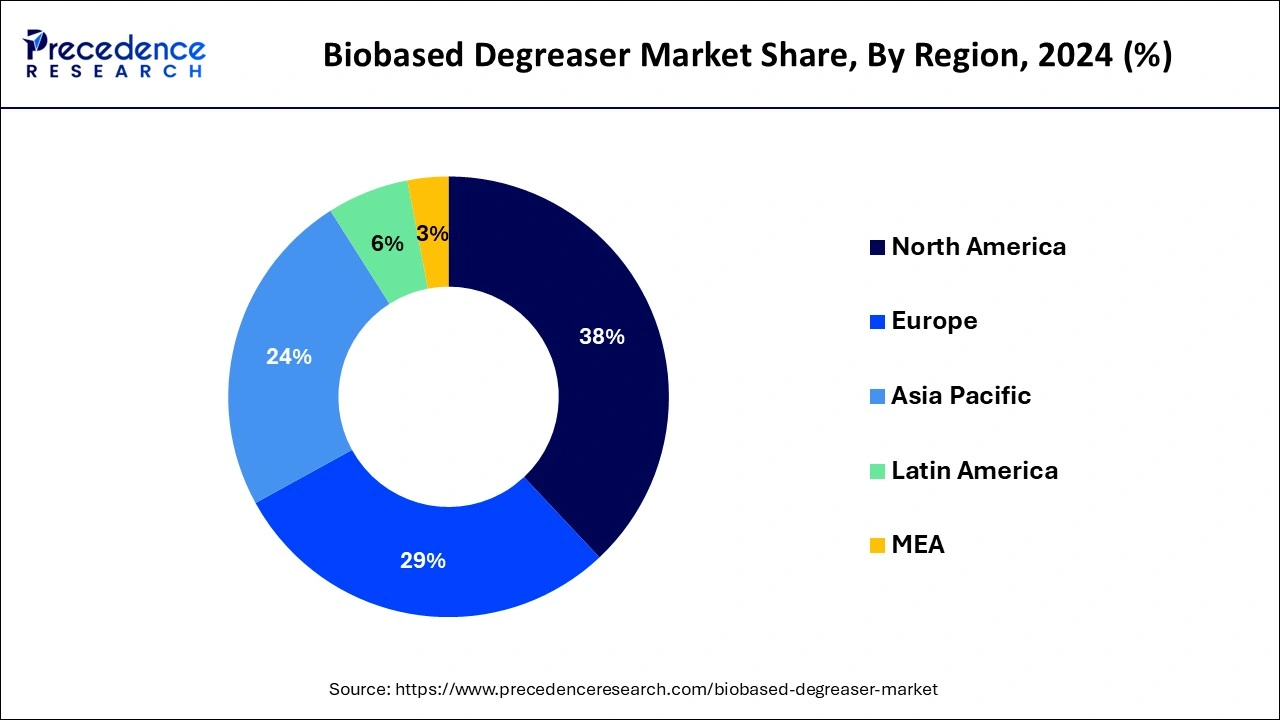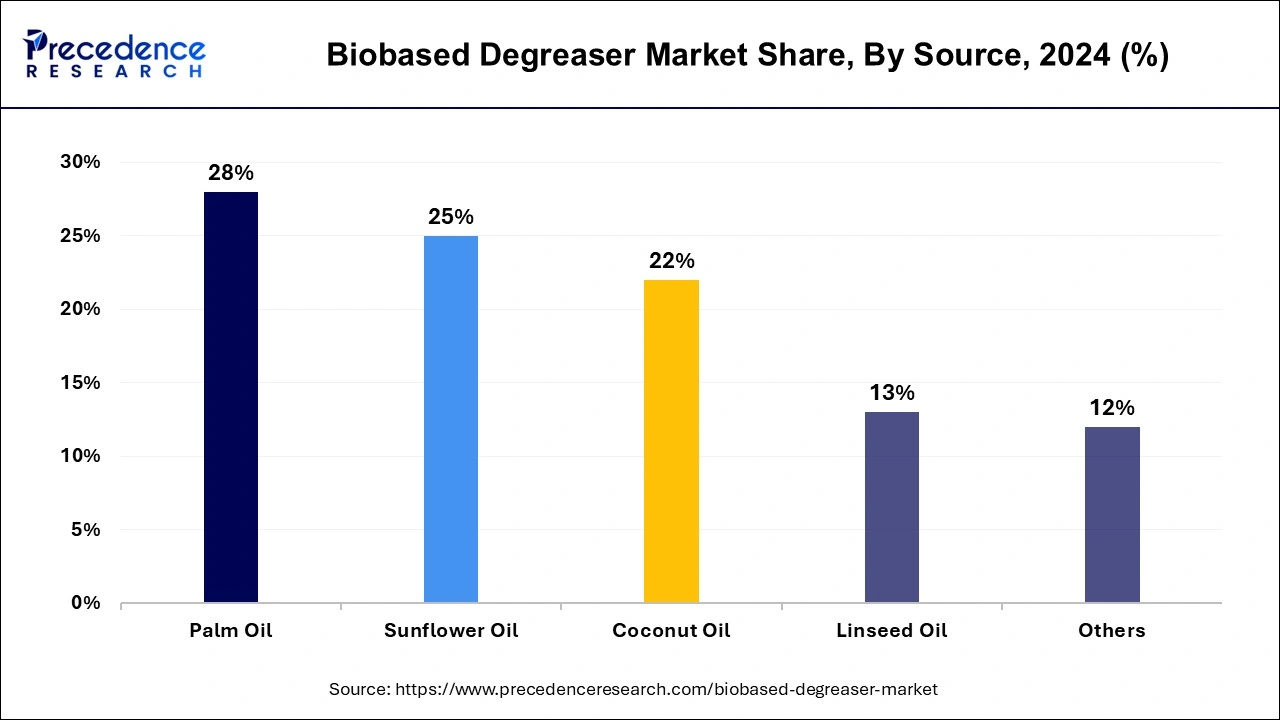The global biobased degreaser market size is calculated at USD 1.13 billion in 2025 and is forecasted to reach around USD 1.78 billion by 2034, accelerating at a CAGR of 5.12% from 2025 to 2034. The North America biobased degreaser market size surpassed USD 410 million in 2024 and is expanding at a CAGR of 5.15% during the forecast period. The market sizing and forecasts are revenue-based (USD Million/Billion), with 2024 as the base year.
The global biobased degreaser market size was estimated at USD 1.08 billion in 2024 and is predicted to increase from USD 1.13 billion in 2025 to approximately USD 1.78 billion by 2034, expanding at a CAGR of 5.12% from 2025 to 2034. The biobased degreasers are more effective and safer than the other solvent products, which may be toxic or harmful. These biobased degreaser products have more benefits than traditional solvent products, which fuels the market growth.

The U.S. biobased degreaser market size was estimated at USD 286.36 million in 2024 and is predicted to be worth around USD 479.61 million by 2034 with a notable CAGR of 5.29% from 2025 to 2034.

North America dominated the biobased degreaser market in 2024. Increased demand for a cleaner work environment and increased awareness about nontoxic, eco-friendly products have led to the growth of the North American market. The United States is the leading degreasing cleaner manufacturer in the North American region. Biobased degreasers are used in general household, medical, and industrial applications in the field of cleaning machinery and metal parts. They are effective in removing grease and oil from machine bearings, gears, and auto engine parts. In the medical field, sterilizing and cleaning instruments and medical equipment are performed in dental clinics and hospitals.

Asia Pacific is estimated to be the fastest-growing during the forecast period of 2025-2034. Increased awareness about biobased degreaser and their various benefits helps the growth of the biobased degreaser market in the Asia Pacific region. Power Clean is India’s one of the top industrial degreasing and cleaning chemicals are biodegradable degreasers and cleaners manufactured and supplied by Roovel Solutions Pvt. Ltd. Rising demand for eco-friendly, biodegradable alternatives for degreasers helps the growth of the market of biobased degreaser in China.
The biobased degreaser market refers to the market that focuses on environmentally friendly degreasing solutions made from natural sources, bio-based or predominantly plant-based ingredients. Biobased degreasers are effective and safe alternatives for the world's toxic and dangerous products. Other than biobased degreaser products being harmful to the environment and humans, switching to biobased degreasers has become the best option. These are used in different industries like agriculture, healthcare, aerospace, food and beverages, oil and gas, automotive, and industrial cleaning applications.
Biobased degreasers have low vapor pressure and high flash points, which help in surface preparation, break cleaning, parts cleaning, and other things. It provides more benefits than traditional solvent products, including maintaining and protecting the structures of the components, such as elastomeric, bearings, gasket, and seal materials. It will not degrade the quality of equipment, parts, and vehicles. It also helps to improve the performance of equipment and systems. Biobased degreasers do not contain any toxic or harmful contents, which helps improve the safety and health of the workers. It also helps to remove pollutants, which removes the negative environmental effects on the organization.
| Report Coverage | Details |
| Growth Rate from 2025 to 2034 | CAGR of 5.12% |
| Market Size in 2025 | USD 1.13 Billion |
| Market Size by 2034 | USD 1.78 Billion |
| Largest Market | North America |
| Base Year | 2024 |
| Forecast Period | 2025 to 2034 |
| Segments Covered | By Source Type, By Product Type, and By End-user Type |
| Regions Covered | North America, Europe, Asia-Pacific, Latin America, and Middle East & Africa |
Rising demand for environmentally friendly cleaning solutions
Biobased degreasers have high demand because they are environmentally friendly cleaning solutions. These are water-based and biodegradable degreasers that do not have any negative impact on the environment. These are the cleaning agents that contain plant-based ingredients and renewable sources without the use of petroleum-based ingredients. Biobased degreasers are also helpful in removing contaminants, grease, and oil from many surfaces, and they offer advantages like regulatory compliance, environmental sustainability, and reduced health risks. Biobased degreasers are helpful in environmentally sensitive areas applications. It does not contain toxic or hazardous decomposition ingredients. It does not cause any problems during handling, storing, and transportation like other solvent products. These factors help to the growth of the biobased degreaser market.
Rising concerns over health and safety
Increased awareness about the use of biobased degreasers and their benefits helps to the growth of the market. Traditional solvent products are harmful to workers, and biobased degreasers are the best option for improving their safety and health. Chemical-based degreasers can affect our health, including lung damage and microbiome disruption, which imbalance our living balance. Also, improper handling of chemical-based degreasers may lead to health issues, including symptoms of nausea, chest pain, shortness of breath, dizziness, etc. N-propyl bromide vapor degreaser overuse can cause chronic health diseases, including cancer and neurological damage. To overcome these many health issues, a biobased degreaser is good for health and safety. These factors help to the growth of the biobased degreaser market.
Performance-based limitations
Biobased degreasers have some limitations in performance compared to petroleum-based degreasers, and they may affect their acceptance. Limited market infrastructure and limited availability of raw materials for the production of biobased degreasers can affect the growth of the biobased degreaser market. These biobased degreasers may be less effective than the solvent products, which are petroleum-based degreasers. The limited availability of biobased degreasers leads to the high cost of these products in the market. These factors restrict the growth of the market.
Research and development
Increased investment in research and development of biobased degreasers is needed to improve their properties. Improving the properties of the biobased degreaser over the other solvent products can lead to the growth of the biobased degreaser market. Investment in the development of infrastructure of the biobased degreaser manufacturing industries and the research for the availability of the raw materials needed for biobased degreasers. These research and development factors can help the growth of the market.
The palm oil segment dominated the market in 2024. Palm oil is a highly used source of biobased degreasers. Biobased degreasers are mostly made from palm oil instead of petroleum-based degreasers because they are less environmentally friendly than palm-oil-based degreasers. Increased production of biosurfactants in petroleum industries due to non-degradability and high toxicity of the chemical surfactants. Mainly, biodegradable oil is used, and it may be obtained from agricultural industrial waste like palm oil mill effluent as support, and it helps to reduce production costs of the biobased degreasers. Rising demand for eco-friendly, nontoxic, and biodegradable degreasers increased the palm oil-based degreasers use in industries including agriculture, healthcare, aerospace, food and beverages, oil and gas, automotive, and industrial cleaning applications. These benefits of palm oil contribute to the growth of the segment and contribute to the biobased degreaser market.

The sunflower oil segment is expected to grow the fastest during the forecast period. Sunflower oil is used in the biobased degreaser. Sunflower oil is mostly used for skin care or skin cleansing purposes. It is highly used in cosmetic products. It helps remove impurities and maintain hydration. For oily skin, it is best to use sunflower oil, which offers complementary and unique benefits. Sunflower oil can fight against wrinkles and acne. The sunflower oil-based degreasers are also used in industrial cleaning purposes. These factors help the growth of the sunflower oil source type segment and contribute to the growth of the biobased degreaser market.
The soy-based degreaser segment led the biobased degreaser market in 2024. Soy-based degreasers are highly effective at removing grease, oil, and contaminants from surfaces, machinery, and equipment. Their natural solvent properties, combined with surfactants derived from soybean oil, enable efficient cleaning and degreasing without compromising performance or safety. Soy-based degreasers can often match or exceed the cleaning efficacy of traditional petroleum-based degreasers. Soy-based degreasers are biodegradable and environmentally friendly, making them preferable for applications where environmental stewardship is a priority. These degreasers contain no harsh chemicals or toxic solvents, reducing the risk of air and water pollution, soil contamination, and harm to ecosystems. They are safer for workers, reduce exposure to hazardous materials, and promote a healthier work environment.
The industrial cleaning end-user segment dominated the biobased degreaser market in 2024. Biobased degreasers are highly used in the industrial sector because they are more effective and safer than toxic and dangerous products. They have low vapor pressures and high flash points, which makes them safer products to buy. Application in industrial cleaning, including surface preparation, brake cleaning, parts cleaning, and others. Biobased degreasers are used to clean vehicle components.
Biobased degreasers have more benefits than traditional solvent products, including maintaining and protecting the structure of the components like elastomeric, bearings, gaskets, and seal materials. It does not contain any harsh ingredients and does not degrade the quality of equipment parts and vehicles. It helps to improve the performance of equipment and systems in the industry. These biobased degreasers help to improve the safety and health of the workers in the industry.
The negative environmental effects of the organization can be reduced by the use of the biobased degreaser. The eco-friendly replacement to the solvent products helps with industrial cleaning and offers odor removal, impressive stain, safety, and biodegradability. These various benefits help to the growth of the segment and contribute to the growth of the market.
By Source Type
By Product Type
By End-user Type
By Geography
For inquiries regarding discounts, bulk purchases, or customization requests, please contact us at sales@precedenceresearch.com
No cookie-cutter, only authentic analysis – take the 1st step to become a Precedence Research client